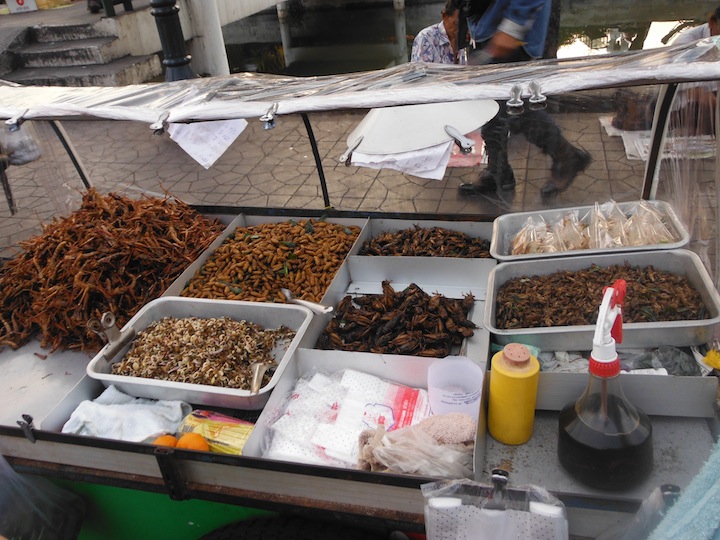Parshas Vayigash: The Benefit of Being “Different”
We’re back in the second/third world, and boy, am I glad to be back. It’s rough going – even last night I was sweating and complaining about the heat – and if I’m hot, then it must be really hot! It’s even harder with a baby, since he has to adjust to new time zones, lots of stimulation, and unfamiliar surroundings.
One thing that strikes me immediately in such a place is just how different we are as Jews. Last night I watched a man eating bugs – there were cockroaches, maggots, grasshoppers, and even scorpions, all fried and for sale. Even if we wanted to, we couldn’t partake of such “delicacies.” I saw a sign in one shop advertising live bullfrog for dinner. I’m sure a lot of tourists would go try it (I’m reminded of a trip to Scotland with a friend who insisted on trying the haggis) because it’s a novelty and hey, why not! But as Jews, we can’t do that. It’s not kosher.
In this week’s parsha we see Yaakov (Jacob) traveling down to Egypt. Along the way, he has a dream in which Hashem (G-d) comes to him and tells him not to be afraid, that he should resettle in Egypt. Was Yaakov afraid? And why did he have to stay in Egypt? It makes sense why Yosef (Joseph) would need to stay in Egypt, but why Yaakov? What was so important that G-d Himself had to command him to go live there?
Egypt was fundamentally different from Canaan (the land of Israel at that time). Yaakov’s father and grandfather lived there and were well known and respected. For the most part, the family was accepted. Perhaps they were viewed as a bit eccentric, or even heretical, but nobody in those days cared all that much. In fact, as Rabbi Bernie Fox of the OU points out, the Canaanites’ acceptance of Yaakov’s family was so total and complete that Shechem, a prince, fell in love with and asked to marry Yaakov’s daughter Dina. Even when told that he and his entire city would have to be circumcised (as adults, with no anesthetic!), he did it, and commanded his city to do so as well. The Jews were accepted fully.
Egypt, however, was not like that. There, Yaakov’s family would really be viewed as heretics, and in the wildly religious Egypt, that was not something to be overlooked. The Jews were not even permitted to eat at the same table as the Egyptians! This applied even to Yosef, who was second to no one but Pharaoh himself. In Egypt, the Jews would remain separate.
You see, Yosef was afraid to leave the land his family had settled, which had been promised to him and his ancestors, which his father (Yitzchak, Isaac) had been forbidden to leave. But he had to go and live in Egypt because if he and his entire family did not, the assimilation would be so total that the Jewish people would have been wiped out before it even began.
Unfortunately, we face this very problem today, quite strongly. In many Western cultures, the assimilation is very strong. Marry someone who’s not Jewish and he won’t mind if you want to celebrate Chanukah instead of X-mas. He’ll be happy to come with you to your Pesach seder, he just might invite you to his family’s Easter dinner. And what’s the harm in that? It’s only a dinner, right? And the circle will spiral downwards – assimilation is a slippery slope that poses a bigger threat to Judaism and does more harm to the Jewish people than, G-d forbid, the Holocaust even did.
We have lost far more than 6 million Jews to assimilation throughout history, and the number is now increasing exponentially. That’s why sometimes it is good to head for the third world, where we are so different. Our “otherness” is striking to both them and us. It brings home to us just how different we are – and how different we must remain.
Shabbat shalom!
Read more on Parshas Vayigash: Maintaining Humility in Positions of Power
One Response to “Parshas Vayigash: The Benefit of Being “Different””
Trackbacks/Pingbacks
- Parshas Vayigash: Remember Who You Are | Travelling Rabbi - [...] Read more on Parshas Vayigash: The Benefit of Being “Different” [...]








Often people are faced with the question of where to send their children to school. I believe the Lubavitcher Rebbes approach was that it is better to send kids to a totally non-Jewish school than to a secular Jewish school. in the non-Jewish environment the child will always no that they are different, wheres in a secular Jewish environment the child can become confused and not no who they truly are.